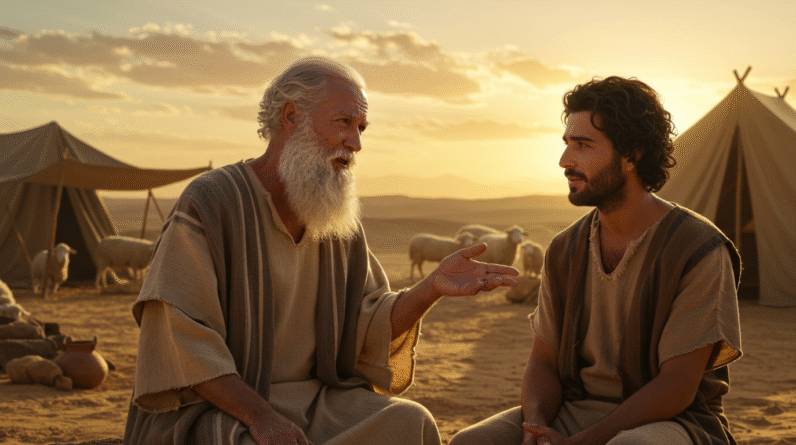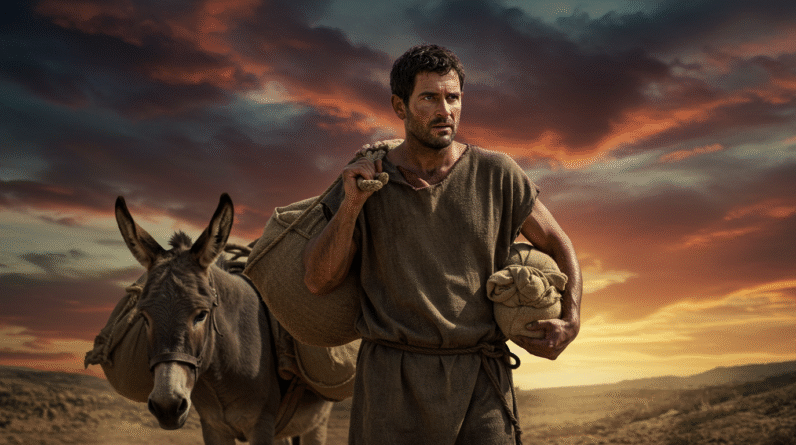Explore Kish’s life in the Bible, father to Israel’s first king. His story shows how ordinary acts can have extraordinary impacts. Discover lessons for today.
Exploring the Life of Kish in the Bible

Introduction
What springs to mind when you think of Kish? Among the lesser-known figures in the biblical tapestry, Kish holds a pivotal place as the father of Saul, Israel’s first king (1 Samuel 9:1-2). The story of Kish, though brief in the pages of the Bible, sets the stage for monumental events in the history of Israel. By exploring Kish’s life and lineage, we can appreciate his indirect yet significant impact on the nation’s history and the fascinating lessons his life unfolds.
Their Story in the Bible
Kish’s narrative begins in the tribe of Benjamin, where his lineage is documented as one of stature and influence (1 Samuel 9:1-2). Although Kish himself doesn’t partake in epic tales of heroism or divine encounters commonly explored in biblical texts, his role as Saul’s father thrusts him into a chain of significant events. It’s within this backdrop of familial dynamics and tribal customs that Kish inadvertently influences the trajectory of the Israelite monarchy.
The most notable incident involving Kish is the search for his lost donkeys, which propels Saul into an unexpected encounter with the prophet Samuel (1 Samuel 9:3-14). It is a seemingly mundane event that leads to Samuel anointing Saul as king. Through this simple narrative device, we see how Kish’s everyday concerns set off a chain reaction with divine ramifications, illustrating how God’s plans often unfold through ordinary circumstances. Although Kish may not wield power directly, the search for his donkeys ultimately becomes the catalyst for Saul’s crowning.
Lessons from Their Life
Kish’s story is emblematic of how small, seemingly insignificant actions can ripple through history. One of the first lessons his life teaches us is the value of humility and the role of supporting acts. Kish shows us that you don’t need to be at the forefront to influence the course of history. His position, though unassuming, was essential in God’s larger storyline for Israel. This reminds us to recognize the important roles of those who stand behind the scenes, whose everyday decisions might engender momentous change.
Another lesson we glean from Kish is the trustworthiness of God’s timing and orchestration. Kish’s response to his missing donkeys was simply to search for them. Yet, this ordinary decision was instrumental in fulfilling a divine appointment. It teaches us to be faithful in our daily tasks, however menial they might seem, trusting that they can play a part in a broader divine purpose.
Moreover, Kish’s authority within his family and tribe brings to light the importance of leadership in the private sphere. By guiding his son Saul, albeit imperfectly at times, Kish reveals parental influence in preparing the next generation for God’s mission.
Connection to Today’s World
Kish’s story resonates today, reminding us that the ordinary aspects of life, like taking care of daily responsibilities, can lay the groundwork for extraordinary outcomes. In an era where fame and recognition dominate cultural aspirations, Kish encourages a re-evaluation of significance, grounded not in prominence, but in faithfulness to one’s duties, regardless of scale. His life prompts reflection on how personal actions, grounded in integrity and diligence, contribute to larger narratives that shape communities and, sometimes, history itself.
Considering Kish’s life inspires us to reflect on how we navigate life’s mundane moments. Much like his search for lost donkeys led to a national turning point, our everyday struggles and efforts might unknowingly align with a higher calling or community transformation. Whether in family roles, professional responsibilities, or community engagement, Kish’s narrative invites us to be attentive to the divine tapestry weaving through the ordinary.
Key Bible Verse
The verse that most encapsulates Kish’s legacy is: “There was a Benjamite, a man of standing, whose name was Kish, son of Abiel” (1 Samuel 9:1). This verse signifies Kish’s standing and influence within his tribe, setting up his son Saul’s rise to kingship. His status within Benjamin suggests the weight of family reputation in ancient times—a detail that underscores the importance of heritage and legacy.
Thought-Provoking Question
Reflect on your own life: How might your everyday decisions and actions be positioning you within a greater context of influence, like Kish? Could the simple tasks you perform daily be preparation for an unexpected call to impact others?

Optional Add-Ons
Historical/Cultural Context
Understanding Kish’s era is crucial to appreciating his impact. Tribal affiliations were of great significance in ancient Israel. The tribe of Benjamin, where Kish hailed from, was one of the smallest, yet it had a formidable reputation in Israel’s history. The cultural dynamics of such a tribe would have shaped Kish’s understanding of family roles, social influence, and leadership.
Comparison with Other Characters
Kish can be compared to other paternal figures in the Bible who indirectly influenced events, such as Jesse, King David’s father. Both men, without prominent stories of their own, produced sons who were crucial to Israel’s development. This comparison highlights the quiet strength of parental figures who provide the foundation for their children’s larger narratives.
Prayer
Let us pray: Dear God, help us to trust in Your timing as Kish did, acknowledging that our daily tasks can lead to extraordinary outcomes. Teach us to find contentment in supporting roles, offering You the best of our abilities, and trusting in Your grand design. Amen.
Conclusion
In the legacy of Kish, we find a reminder of how seemingly mundane actions can weave into destinies of great significance. Although his role might not hold the dramatic flair of more prominent biblical figures, the ripple effects of Kish’s life impact the course of a nation. As you unravel the biblical account of Kish, let his story encourage you to embrace your influence, however subtle, in today’s world.







